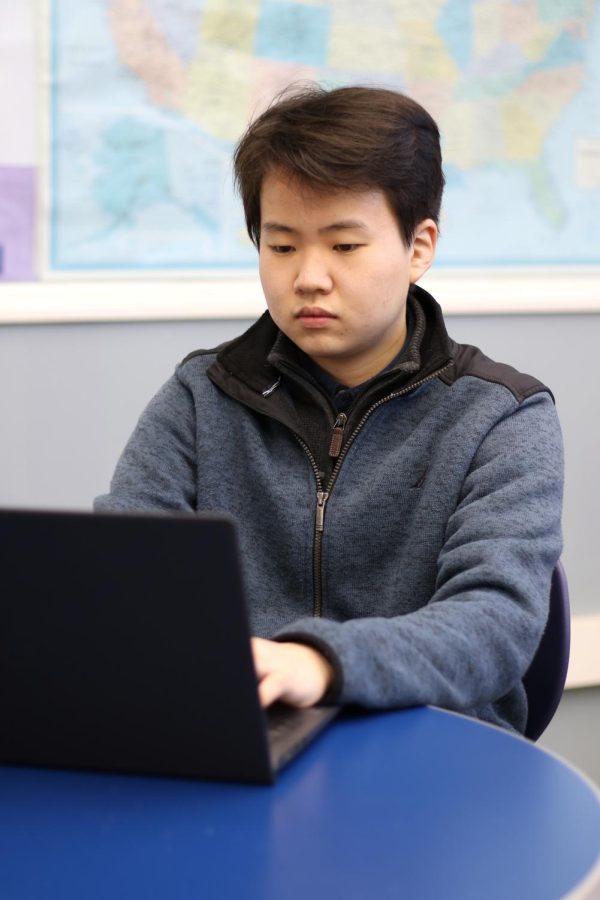Pali Student’s Groundbreaking Research Alters Trajectory of Bioengineering Research
MIT-Bound Theo Jiang Uses Artificial Intelligence to Improve Early Cancer Detection
March 3, 2022
Killing nearly 600,000 Americans in 2019, cancer is the most deadly human protein mutation disease, according to cancer.org. In an attempt to contribute to the scientific community’s efforts to combat cancer, Pali senior and bioengineering admit at the Massachusetts Institute of Technology (MIT) Theo Jiang developed technology that uses Artificial Intelligence (AI) to detect harmful protein mutations in their earliest stages.
According to cancer.org, current cancer screening methods struggle with detecting the disease early. Jiang said that his AI technology addresses this problem by searching for the mutations that cause cancer, rather than simply identifying symptoms.
Jiang said that his technology’s ability to increase early detection rates will enhance cancer treatment, while also providing a springboard from which other bioengineers can better understand the human genome. Jiang will present his project at the Regeneron Science Talent Search (Regeneron STS) in mid-March.
The Regeneron STS is among the most prestigious science competitions in the nation. Established in 1942, the contest was developed in order to identify and encourage high school students with groundbreaking research and significant breakthroughs in the field of science. The rigorous application process selects 40 finalists from an initial pool of 2,000 applicants. The application consists of the student’s research report, an educator or mentor recommendation, and a high school report. The 2022 finalists compete for a prize pool of $1.8 million, with $250,000 going to the first-place winner.
Despite “the idea [of bioengineering being] that it allows you to engineer your own cells,” Jiang said that an issue current bioengineers face is not understanding “how the human genome works.” This hole in genetic knowledge hinders bioengineers’ ability to engineer cells, Jiang said.
“The general goal of my project is to improve our understanding of potentially how the language of the genome works,” he said.
Jiang’s project centers around AI technology that can infer the language of the human genome, a function vital to engineering cells and identifying possible cancer-causing protein mutations.
He said that “the AI learns the [human genome] language,” then outputs it as the human language. Using AI as a translator solves the issue of comprehending the human genome without sacrificing work efficiency, Jiang added.
“AI as a computational tool has already proven to be really useful in a variety of fields,” Jiang said.
The recent innovations in AI technology have quickly accelerated, creating new opportunities in healthcare. A survey conducted by health care provider Optum reports that 98 percent of the 500 healthcare organizations surveyed are currently utilizing AI technology or are planning to begin incorporating AI into their practice, according to healthleadersmedia.com.
Jiang believes his project will likely pave the way for more practical cancer treatment. He said that the current means of treating cancer uses “chemicals that target cancer, but there are side effects to these chemicals because it doesn’t specifically target cancer.” He added that a keen understanding of the human genome — made possible by his AI technology —allows bioengineers to create cells with functions specific to combatting the cancer cells, negating the adverse side effects present medicine causes patients. The knowledge allows new methods of cancer treatment that will directly attack cancer cells with mitigated side effects.
To develop and legitimize his research, Jiang started working virtually in a lab at the University of Pennsylvania in the summer of 2021. The lab provided him with the environment and resources needed to complete and verify his project. In order to confirm that his technology improved pathogenic performance, the lab tested his project against established software with more parameters, Jiang said. Testing against these designs ensures that the reason behind his technology’s improved performance was the actual architecture, not the parameters applied to them, Jiang said.
After the tests were completed, Jiang said the lab confirmed that his technology is the “most accurate for pathogenicity prediction right now.”
With the Regeneron STS fast approaching, Jiang said that winning would give him added validation and confidence in his bioengineering abilities. He added that having “actually made something” that has positive implications for both cancer detection and the future of bioengineering strengthened his resolve to move forward in this competitive field of study.












